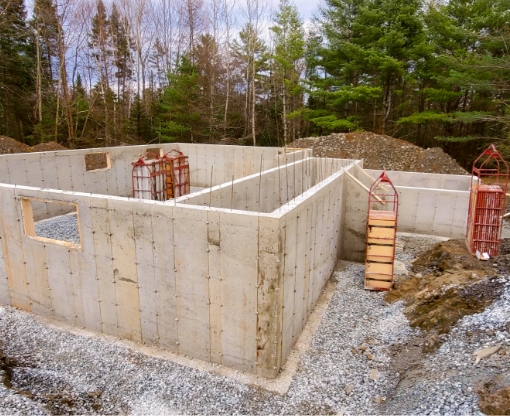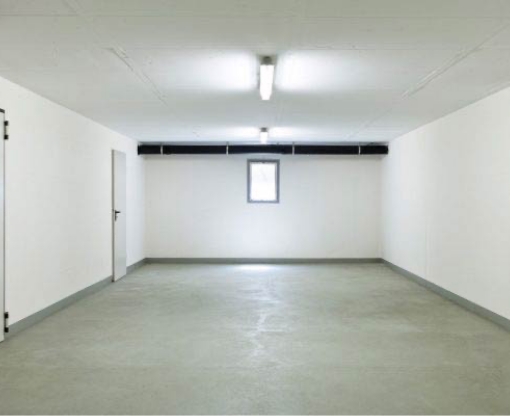
Think Béton Provincial! We can provide you with concrete for many different applications: house foundations and walls, sidewalks, garage entryways, patios, pool decks, garage slabs, etc. You could even go with coloured or stamped concrete, an attractive choice that works both inside and outside your house.
Here is some information you should know before contacting us to place your order.

The foundation is a major part of your home. Since it holds up the entire building, it supports the weight and ensures stability. As concrete experts, we can advise you on the right type of concrete to use for your house foundation, your structural slabs or your flooring slabs.

A concrete driveway or patio is a great way to improve your home’s curb appeal. Concrete can also last for several decades, and is easy to maintain. It is also possible to colour or stamp a pattern into the concrete to produce a unique design.

Concrete flooring must be stronger than that used for foundations. For a garage floor, the concrete must withstand the freeze-thaw cycles when a monolithic slab is used, and withstand calcium if a car will be parked on it during the winter.
Our Grani-Bloc concrete blocks are perfect for your landscaping projects or as temporary backfill. They are both attractive and provide support.
A superplasticizer is an admixture used in the preparation of concrete. It improves the flow characteristics of concrete, increasing its workability without affecting its mechanical properties. Superplasticizers therefore reduce the water/cement ratio in the concrete mixture, which increases its mechanical strength and makes it easier to install.
Ask for an added superplasticizer rather than water to ensure easier concrete installation.
Water is one of the four essential components of concrete, the others being cement, coarse aggregates and sand.
Water is also the most crucial component, because the water-cement ratio determines the concrete’s compressive strength and durability. To ensure a perfect reaction between the water and cement, water is added at the plant following the quantity specified in the formula, while respecting CSA standard requirements.
Water should NEVER be added imprecisely at a worksite or at home. Adding water could cause problems in the future, because water has a direct impact on the strength of your concrete.
Fibre-reinforced concrete provides three-dimensional reinforcement due to its fibre density. It can mean you don’t have to reinforce floor slabs with steel frames, thus saving time and money. The tensile strength of fibre-reinforced concrete is comparable or superior to that of standard reinforced concrete.
Fibres can be added to concrete to increase its post-cracking strength. A “fibre” is a material from 5 to 60 mm long that can be metal, organic or ceramic. Based on their type, these fibres have different characteristics and do not react the same way. Their impact on concrete can therefore vary.
Fibre-reinforced concrete is used in many applications similar to standard concrete.
USE
Fibre-reinforced concrete is easy to use. It produces an excellent finish, and is easy to pump. It is recommended for commercial, industrial, agricultural and residential floor slabs. It is also used in concrete patching and for many other applications, such as foundations and flooring.
FINISH
Fibre-reinforced concrete can be finished using conventional techniques, but some precautions must be taken to prevent the fibre from appearing on the surface and to minimize the risk of cracking at the edges when sawcutting control joints. These precautions include:
To avoid any rapid or excessive loss of moisture at the surface of freshly poured concrete, it is recommended that concrete surfaces be protected from the damaging effects of the wind. Wind can increase the loss of surface moisture and lead to surface flaws.
To avoid this:
(source: ABQ’s Guide du chantier)
Concrete curing is the amount of time required to allow the freshly poured concrete to set in adequate temperature and humidity conditions to ensure that it achieves the desired properties.
The cure must begin as soon as the concrete surface is hard enough not to be damaged. Respect the concrete curing period before form removal and backfilling.
Concrete curing method:
(source: ABQ’s Guide du chantier)
Abrasives are recommended (for example, sand and fine gravel) instead of deicing salt.
We no doubt have a ready-mixed, precast or asphalt solution to meet your needs.
Béton Provincial is the concrete solution for all your residential projects.
Since we have plants throughout Quebec and New Brunswick, there’s one near you, and an advisor ready to help out!